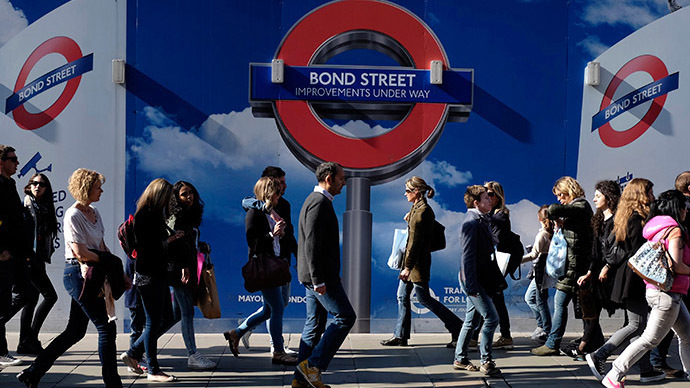Brits happier amid austerity? Experts doubt optimistic govt ‘wellbeing survey’

Brits are the happiest they've been since 2011 as a result of the UK's “improving economy”, a UK government report claims. But experts argue that austerity, public sector cuts and rising inequality are anything but a recipe for national wellbeing.
As part of the biannual personal wellbeing survey by the government-controlled Office of National Statistics, 165,000 respondents were requested to rate their levels of personal satisfaction, life satisfaction, personal happiness and anxiety on a scale of one to 10. The report, “Measuring National Wellbeing,” claims people’s levels of life satisfaction and general happiness have increased steadily throughout the UK since 2011, while the nation’s anxiety levels have declined over the same period.
James Meadway, a leading economist at the New Economics Foundation (NEF), told RT on Friday it was possible that Britons’ levels of wellbeing have increased as official unemployment figures have fallen. But he argued that the ONS survey may have overestimated UK citizens’ happiness levels, suggesting a more “nuanced analysis” would have yielded a more accurate picture.
The ONS’s research suggested that residents of Northern Ireland were the happiest in the UK, while Londoners demonstrated lower than average levels of personal wellbeing. The stats also showed a marginal increase in UK citizens’ trust in their government. Dawn Snape, who co-authored the report, said improved job prospects and increased household incomes over the past 12 months were the main factors, which had increased cheer across the United Kingdom.

Snape suggested that a country’s unemployment rate profoundly influences the wellbeing of its people, whether they are jobless or close to someone who has lost their job. She also argues that grim economic forecasts cause happiness to decrease amongst the employed, who tend to be fearful of losing their jobs.
Among specific relationship groups, Snape said married couples have the highest wellbeing level, while divorcees have the lowest. Northern Ireland had four out of the five “happiest districts” in the UK, according to the ONS research.
Antrim, Fermanagh, Omagh and Dungannon topped the rankings, with Babergh in Suffolk the only place on Britain’s mainland to feature in the top five. Yorkshire residents based in Richmondshire were deemed to be the least anxious, according to the research.
On the question of Northern Ireland’s perpetual optimism, Snape was perplexed. She described their levels of happiness as a “conundrum”, which merited further inquiry – as the group had scored highly in all dimensions of the ONS’s wellbeing index, despite being plagued by high levels of joblessness.
The least-happiest districts in the UK were Barrow-in-Furness in Cumbria, Dartford in Kent, Torridge in Devon, Maldon in Essex, and South Ribble in Lancashire. People in London had overall levels of wellbeing lower than the UK average, and the capital was also estimated to be home to three of the UK’s most anxious areas – the boroughs of Lambeth, Hackney and Barking and Dagenham.

The research was first commissioned by Prime Minister David Cameron in 2010, on the grounds that the government should be informed not only of the country’s economic progress, but also on people’s quality of life.
Britain is no longer technically in recession, but UK citizens continue to live in conditions of considerable economic uncertainty, according to James Meadway. The NEF economist warns that Britain’s economy is characterised by a number of “ingrained weaknesses” and is “the most insecure of any developed economy in the world”. Falling “real incomes” and an overriding “dependency on debt to get the economy moving” have bred a volatile, unstable economic system at risk of further crises, he said.
Meadway argues that while Britain has experienced some economic growth in recent years, inequality has increased dramatically – with the top 10 percent of UK earners benefitting disproportionately from the state’s improved economic climate. And although employment is on the increase in Britain, the economist warns that a considerable proportion of this work is insecure and precarious.
These trends are unlikely to yield increased levels of national wellbeing in the long term, he suggests, saying that a climate of perpetual austerity, public sector cuts, rising inequality and declining real wages is anything but a recipe for happiness.












